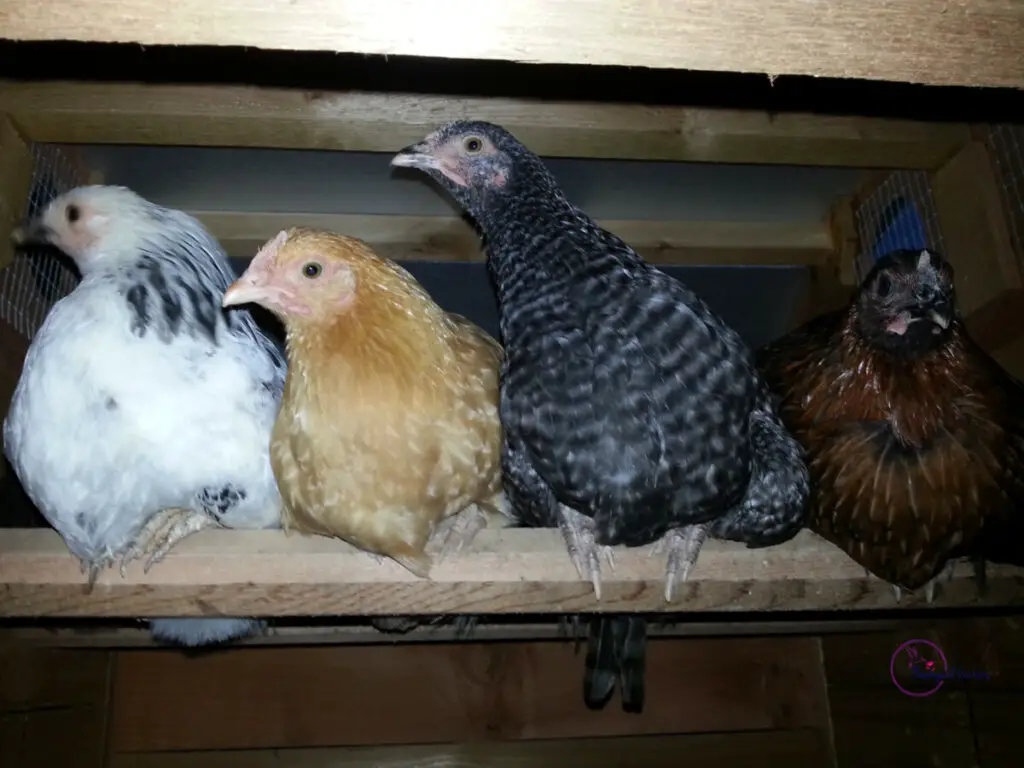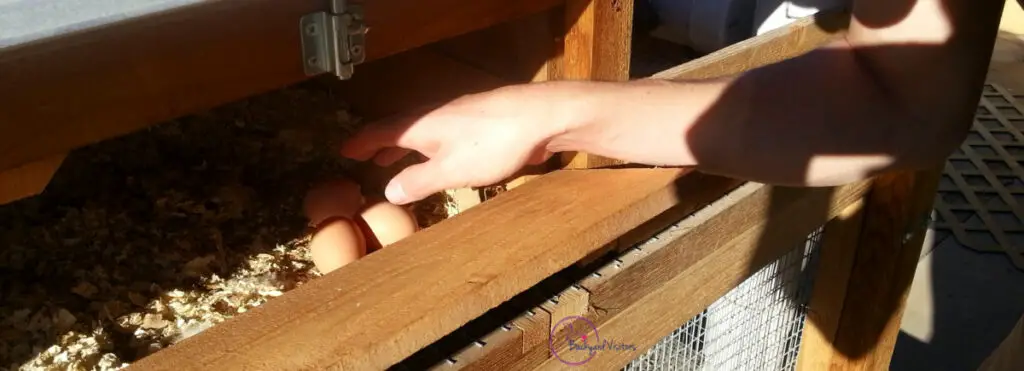This post contains affiliate links.
Learn essential tips for safe interaction between children and chickens. Discover how to teach children to handle and care for chickens properly to ensure a happy and healthy environment for both children and poultry. Perfect for backyard chicken enthusiasts seeking family-friendly poultry care advice.
Welcome to my comprehensive guide on “Safe Interaction Between Children and Chickens.” Ensuring safe poultry interactions is vital, especially when inquisitive young minds explore backyard farming.
My guide provides essential tips and best practices to foster positive experiences between children and chickens, promoting both safety and enjoyment. Whether you are a seasoned backyard chicken keeper or a novice, understanding these interactions is crucial for a harmonious environment. Let us dive in and learn how to create a safe, fun-filled space for your children and feathered friends!
The Benefits of Raising Chickens with Children
Raising chickens with children is an incredibly rewarding experience for the entire family. There are numerous benefits, both educational and entertaining, that originate from having these delightful birds as part of your household. One of the most significant benefits is the unique opportunity it provides for hands-on learning.
As youngsters, my brother and I were really excited when my mom began our family’s journey of raising backyard hens, even though we had no idea what lay ahead for us. She bought pullets instead of hatching eggs, but she had an instant connection to the pullets, and they to her. The whole family participated in the exercise as we discussed the good and bad practices for keeping hens in our garden.

Left to right:
Stealer, Carmel, Ducky, Molasses.
By involving us in the care of the flock, we learned about responsibility as we fed the animals, collected eggs, and cleaned the coop. These activities instilled a sense of accountability and the importance of caring for other living beings, laying a strong foundation for responsible parenting skills in the future.
The fun does not end with chores. Children find it immensely enjoyable to watch these feathered friends in their daily antics, from scratching around the yard to the occasional comedic chase. This kind of organic entertainment keeps children engaged and promotes a healthier lifestyle.
The relationship that forms between children and their chickens fosters emotional development. A child’s bond with their pet not only provides comfort but also teaches empathy and compassion, qualities valuable throughout life.
Another significant benefit is the educational aspect of raising chickens. Children have the opportunity to learn about biological processes first-hand, from witnessing egg-laying to understanding the life cycle of birds. This kind of immersive learning experience ignites a passion for science and nature.
The whole family benefits from shared activities around the home, strengthening family bonds. Spending time together outdoors engrossed in these rewarding tasks is an excellent way for everyone to spend quality time.
Raising chickens offers practical benefits. Freshly laid eggs are a delightful addition to any family’s kitchen and are more nutritious. Collecting eggs each morning becomes a fun tradition for the children.

Children engaged in these activities learn where food comes from and fosters a deeper appreciation for their meals which translates into healthy eating habits. Additionally, having chickens at home is a gateway to learning about other farm animals, paving the way for a broader interest in farming and sustainability.
Overall, the benefits of raising chickens with children are multifaceted. From educational advantages to fostering a loving relationship with animals, the time spent caring for these birds enhances both the home environment and the emotional well-being of every family member involved.
By integrating chickens into your daily life, you create a nurturing, educational, and fun environment that fulfills both children and adults, making the whole experience worth every minute.
Read my other related articles:
- Backyard Chickens and Children: A Guide to Raising Chickens as a Family Project
- Benefits of Raising Chickens for children: Responsibilities and Learning
- Fun and Educational Chicken-Related Activities for Families
- Choosing the Right Chicken Breeds for Families with Children
- Building a Kid-Friendly Chicken Coop
- Lessons in Sustainability and Nature for Kids Through Chicken Keeping
- Sharing the Backyard Chicken Keeping Journey
Identifying the Risks of Children Handling Poultry
It is crucial to understand the risks involved in children handling backyard poultry. While raising chickens with children is rewarding, there are essential safety and health considerations to keep in mind to ensure secure and positive interactions.
One of the prominent risks is the transmission of salmonella, a bacteria commonly found in birds, which can significantly impact a child’s health. Proper hand hygiene is paramount when children interact with poultry. Ensure they wash their hands thoroughly after touching the coop, the birds, or any related equipment.
Physical injury is another risk of concern. Chickens peck, and sometimes bite, particularly if they feel threatened. It is essential to teach children the correct way to handle animals to avoid stressing the birds and causing inadvertent injuries.
Always supervise young children during their interactions with poultry to ensure safety and secure handling practices.
Public health experts emphasize the need for a clean environment as dirty coops will harbor harmful bacteria and parasites. Regular cleaning and maintenance of the coop helps prevent potential health risks. Moreover, children should avoid ingesting food in the vicinity of where the birds are kept to minimize the risk of food contamination with bacteria from the poultry.
Teaching children about the importance of gentle interactions helps foster respect and care for animals and ensures the well-being of both the child and the bird. It is advisable to consult with a poultry care expert to better understand and mitigate the risks associated with children handling poultry.
Ensuring chickens are vaccinated and regularly checked by a veterinarian is another step in reducing health risks to children.
A healthy flock means a healthier interaction for your child. It is vital to educate the children about the behavior of birds. It is important for them to recognize signs of distress or aggression in chickens, to ensure that they will handle poultry securely and safely.
While there are significant benefits to raising chickens with children, it is vital to be informed about the risks. Be proactive about hand hygiene, maintain a clean coop, and provide proper care and supervision to create a safe and enjoyable experience for both the child and the poultry.

This article aims to provide a comprehensive understanding of the potential hazards and the best practices to promote secure and healthy interactions between children and their feathered friends.
Best Practices to Promote Secure and Healthy
Interactions Between Children and Chickens
- Supervision: Always supervise interactions between children and chickens to prevent accidental harm or rough handling.
- Hygiene Practices: Teach children to wash their hands thoroughly with soap and water before and after handling chickens to prevent the spread of germs.
- Gentle Handling: Instruct children on how to gently and calmly handle chickens to reduce stress for the birds and minimize the risk of injury.
- Protective Footwear: Encourage children to wear appropriate footwear, such as closed-toe shoes, when around chickens to protect their feet from scratches or pecking.
- Safe Enclosures: Ensure chicken enclosures are securely built to keep chickens safe from predators and prevent children from accidentally disturbing nesting areas.
- Educate on Behavior: Teach children about chicken behavior and body language so they can understand when a chicken is stressed or uncomfortable.
- Vaccinations and Health Checks: Keep chickens up-to-date with vaccinations and regular health checks to prevent the spread of diseases to children.
- Designated Feeding Areas: Establish specific feeding areas and teach children not to feed chickens by hand directly to prevent potential bites and ensure hygiene.
- Age-Appropriate Tasks: Assign age-appropriate tasks and responsibilities to children when helping with chicken care to ensure safety and proper care for the birds.
- No Face Contact: Advise children to avoid close face contact with chickens to minimize the risk of zoonotic infections.
- Teach Respect for Animals: Foster a sense of respect and empathy in children towards chickens, helping them understand that chickens are sentient beings with needs and feelings.
- Safe Clean-Up: Instruct children on safe ways to clean chicken coops and areas to avoid exposure to harmful pathogens.
Precautions to Take When Raising Backyard Chickens with Kids
Raising backyard chickens is a rewarding experience for the entire family, including children. However, it is essential to take certain precautions to ensure that the interactions between children and chickens are safe and secure.
One of the primary precautions is to maintain a clean and secure chicken coop. Establish that it is free of sharp objects or fixtures that may harm children or the chickens. Supervised time in the coop helps children learn how to handle farm animals gently and responsibly.
Another vital aspect of safe interactions is proper hand hygiene. Teach children to wash their hands thoroughly with soap and water after touching the chickens, their food, or any items from the coop. This helps to prevent the spread of germs and reduces the risk of infections. It is also important to instruct the children to avoid putting their hands near their mouths or eyes during and after these interactions.
When feeding the flock, use designated feeding areas to avoid cross-contamination. Children should be taught how to distribute food appropriately without startling the chickens. This is crucial in helping them understand animal care while minimizing potential risks.
Setting boundaries is another important precaution. It is crucial to explain the rules of when and how they interact with the chickens. Make sure they understand that sudden movements or loud noises will stress the chickens, potentially leading to defensive behavior. This kind of parenting ensures that both the children and the flock are safe.
Additionally, make a habit of regular checks for both the children and the flock. Inspect for any signs of illness or injury in your chickens. Knowing your flock’s normal behavior helps spot changes early.
Simultaneously, keep an eye on your children for any allergic reactions or unusual symptoms that might arise from handling chickens.
Finally, education plays a key role to ensure safe interactions. Spend time teaching your children about the various aspects of raising chickens—such as how to recognize when a chicken is unwell or how to provide proper care. Use age-appropriate resources or farm visits to make the learning process engaging.
Bringing chickens into your home is a wonderful way to teach responsibility and compassion, but it must be done with the appropriate precautions. Proper planning and education paves the way for safe and enjoyable interactions between your children and your backyard flock.
Read my article:
Chickens As Indoor Pets: The Ultimate Guide
Safe Interactions Between Kids and Chicks
Ensuring safe interactions between children and chicks is vital for both their well-being and enjoyment and safety should always be the top priority to create a secure environment for everyone.
Interactions with chickens is educational and fun and fosters a unique relationship between children and these delightful birds. The first step to promote safe interactions with baby chicks involves educating children on proper handling techniques. Always encourage children to wash their hands both before and after handling chicks. This precaution significantly reduces the risk of spreading germs and diseases that poultry may carry.
Supervise very young children during their time with the chicks to ensure appropriate gentle handling of the chicks. It is important to establish a dedicated time for interactions between children and the chicks. This structured approach allows for mindful care and avoids overwhelming the chicks.
Show children how to pick up and hold the chicks properly. A gentle hand cradle with one hand to support the bird’s body and the other securing its wings will prevent injury. Remind children that chicks are delicate and should not be squeezed.

Safe interactions mean more than just physical handling. It is about teaching children to be observant. Encourage them to notice the chicks’ behavior and needs, fostering empathy and respect for animal care.
Fashion a secure outdoor or indoor space for these interactions to create a safe environment. This area should be free of hazards that might harm the chicks or the children. Spending time together with chicks is incredibly rewarding as children observe the growth and development of the chicks and even collect eggs when the chicks mature into hens.
This ongoing involvement nurtures a positive and educational relationship between children and their poultry pets. By establishing a routine that ensures clean and safe practices, and teaches children how to safely interact with chicks, families will enjoy all the benefits of raising poultry while maintaining a high standard of safety.
Safe interactions between children and chicks are about balancing fun and care. Educate, supervise, and secure the environment to promote an enriching experience for both children and their feathered friends. With the right approach, these interactions will be a highlight of family time.
Check out my other posts on Backyard Chickens
Frequently Asked Questions
Q: What are the benefits of raising chickens with children?
A: Raising chickens with children offers various benefits such as hands-on learning, fostering responsibility, and providing organic entertainment. Children learn about feeding, collecting eggs, and maintaining the coop, which teaches them accountability. Additionally, observing chickens’ antics will keep children engaged while promoting a healthier lifestyle and away from screens.
Q: How can children bond with chickens?
A: Children can bond with chickens through daily care activities such as feeding, collecting eggs, and cleaning the coop. These tasks instill a sense of responsibility and empathy. Moreover, time spent watching and interacting with the birds fosters emotional development, teaches children about compassion and forms a comforting bond with their pets.
Q: What safety precautions should be taken when children handle chickens?
A: Safety precautions include teaching proper hand hygiene, supervising young children, and ensuring clean coop maintenance. Children should wash their hands thoroughly after touching chickens or any related equipment to prevent the spread of germs. Supervised handling helps avoid physical injuries, while regular coop cleaning reduces health risks from bacteria and parasites.
Q: How can you teach children to handle chickens properly?
A: To teach proper handling, instruct children to approach chickens calmly and avoid sudden movements. Show them how to gently pick up and hold chickens, supporting the bird’s body and securing its wings. Encourage children to be observant of chickens’ behavior, recognizing signs of distress to ensure gentle interactions.
Q: What health risks are associated with children handling chickens, and how can they be mitigated?
A: Health risks include the transmission of diseases such as salmonella and potential physical injuries from pecking or biting. Mitigation strategies involve enforcing proper hand hygiene, educating children on gentle handling, maintaining a clean environment, and ensuring chickens are vaccinated and regularly checked by a veterinarian. Supervision during interactions further ensures safety.
Q: How can you create a safe environment for interactions between children and chickens?
A: A safe environment includes a clean and secure coop, free of sharp objects and potential hazards. Establish designated feeding areas and supervise interactions to prevent startling the chickens. Set clear rules and boundaries for when and how children will interact with the birds and teach them to handle the chickens gently and calmly.
Q: What are the practical benefits for families raising chickens?
A: Practical benefits include access to freshly laid eggs, which are nutritious and enjoyable to collect. Raising chickens also teaches children where food comes from, promoting healthy eating habits and an appreciation for meals. Additionally, it will spark a broader interest in farming and sustainability practices.
Q: How does raising chickens foster educational growth in children?
A: Raising chickens allows children to learn about biological processes firsthand, from egg-laying to bird development. This immersive experience will ignite a passion for science and nature. Shared family activities around caring for chickens also strengthen family bonds and provide quality time outdoors.
Q: Why is proper hygiene crucial when children interact with chickens?
A: Proper hygiene is crucial to prevent the spread of bacteria and diseases such as salmonella. Children should wash their hands thoroughly before and after handling chickens, their food, or any coop items. This practice minimizes the risk of infections and promotes a healthier environment for both children and chickens.
Q: How can children safely interact with baby chicks?
A: Safe interactions with baby chicks involve supervised handling, gentle care, and proper hand washing before and after contact. Children should be taught to pick up chicks gently, supporting their delicate bodies. Creating a secure, hazard-free space for these interactions ensures the safety and well-being of both the chicks and the children.
Paying It Forward
Backyard Visitors participates in affiliate programs which compensate us for referring traffic.

